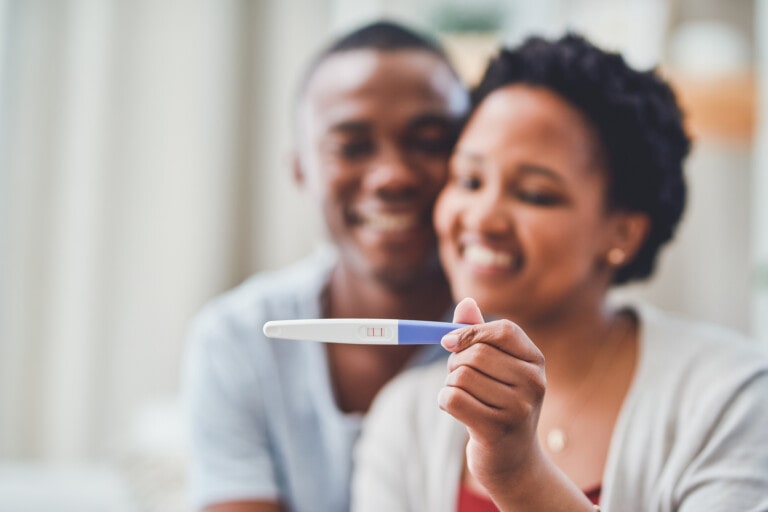If you’ve ever been pregnant or even thought about having a baby, you’ve likely heard the term “non-invasive prenatal testing,” or NIPT. Maybe you’ve heard about it from friends, family, or your OBGYN. Or perhaps you’ve read about it on online baby forums. Though NIPT has become relatively mainstream in recent years – with millions of pregnant women taking this type of test every year – it’s still relatively new. Understandably, there are some misconceptions.
Before we dive into what you should know about NIPT, let’s review what NIPT is. Simply put, NIPT can provide genetic risk information about your baby as early as nine weeks into pregnancy from a simple maternal blood draw. Genetic information from the baby, called cfDNA or cell-free DNA, is floating around in the mother’s bloodstream throughout pregnancy. By analyzing tiny pieces of the baby’s DNA, expectant mothers can better understand their baby’s risk of having certain genetic conditions. They can also plan for their baby’s care and may be able to improve their baby’s health.
What You Should Know About Prenatal Testing
As a genetic counselor who specializes in NIPT, here are the six things I believe everyone should know about NIPT, no matter where they are in their pregnancy journey:
1. Screening vs. Diagnostic
Before you consider doing NIPT, it’s essential to understand that NIPT is a screening test. It is NOT a definitive diagnostic test. This means the test can tell you whether the risk of your baby having specific genetic conditions is high or low, but not if your baby has the condition. If the risk is high, diagnostic testing done either during the pregnancy or after birth is needed to confirm the presence of the condition.
Traditional prenatal diagnostic tests such as amniocentesis (amnio) and chorionic villus sampling (CVS) are highly accurate in diagnosing genetic conditions. However, they’re also invasive and carry a slight risk for miscarriage. This is why many women choose non-invasive screening tests, like NIPT, as a first step. They pose no threat to the baby and may help reduce the need for invasive procedures.
2. What NIPT Screens For
NIPT is a widely used screening tool for chromosomal differences. These differences can include Down syndrome (Trisomy 21), Trisomy 18 (Edwards syndrome), Trisomy 13 (Patau syndrome), and other genetic conditions. This also includes genetic conditions caused by microdeletions, which are small, missing parts of a chromosome. The most common of these is the 22q11.2 deletion syndrome (DiGeorge syndrome/VCFS) which was recently found to be more frequently identified than previously believed.1 The 22q11.2 deletion syndrome is more common than other conditions like Cystic Fibrosis or Sickle Cell Anemia which are typically screened for during pregnancy.
NIPT can be performed for singleton, twin, egg donors, and surrogate pregnancies. And for those with twins on the way, certain NIPTs can determine if the twins are identical or fraternal. Not all NIPTs use the same technology, however. Nor do they all screen for the same conditions. Always be sure to research the available tests and talk to your health care provider about your needs to help determine which test is right for you.
3. What Happens if I Get a High-Risk Result?
Because NIPT is a screening test, there is a chance of receiving a high-risk result when the baby is not affected by a specific genetic condition (sometimes called a false positive). Genetic counselors strongly advise everyone who receives a high-risk result to speak with their health care provider. If available, a board-certified genetic counselor to help ensure that they understand what their results mean and know what the next best steps are for them.
Genetic counseling may be offered as a complimentary service depending on the type of lab that performs the NIPT screening. Confirmatory diagnostic testing is always needed to know for sure if a high-risk result is positive. It can be done during or after a pregnancy. Knowing what to expect can ensure you have all of the information you need to adequately plan for your family’s future.
4. NIPT is a Highly Reliable Screening Option
Over the past decade, scientists and researchers have made great strides in improving the accuracy and performance of NIPT. These are still screening tests and, therefore, not designed to be 100% accurate. But they are more accurate and effective than ever before. The accuracy varies based on the lab selected and the condition being screened for. For example, NIPTs have been shown to have greater than 99% accuracy when screening for Down syndrome as indicated in a recent study of over 20,000 patients.2
5. All Women Can Have NIPT
Until recently, it was recommended that only women over 35 years of age have NIPT. Last year, the American College of Obstetricians and Gynecologists (ACOG) and the Society for Maternal-Fetal Medicine (SMFM) released an updated practice bulletin on screening for fetal chromosomal abnormalities.3 It recommended NIPT be offered to all women, regardless of age or risk factors. This was a significant step forward for pregnant women that later helped to expand health care coverage and access to NIPT for all women. As a genetic counselor, I encourage all women who are pregnant or planning a pregnancy to discuss NIPT with their health care provider to see if it is the right option for their family.
6. You’re Not Alone in This Process
NIPT can help lessen the anxiety and uncertainty around pregnancy and their baby’s health for many women. But for others, it may be a stressful experience, especially for those who receive a high-risk result. NIPT is not always the best option for everyone. Deciding to have NIPT screening is a personal decision that should be made only after fully considering the benefits and limitations of the test.
Everyone has choices, which means some women will decide to have an amnio. Other women will choose not to do NIPT screening or diagnostic testing. If you’re having difficulty deciding whether NIPT is right for you, speak with your health care provider or a board-certified genetic counselor. They can help answer your questions and talk to you about your options.
Check out some helpful resources below for more information about NIPT and genetic counseling:































